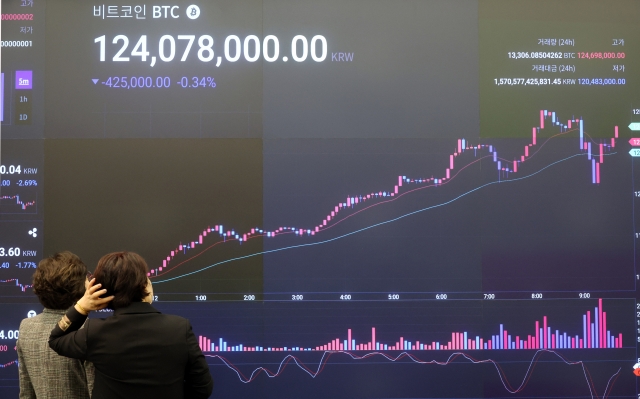Bitcoin hits record in Korea, even without ‘kimchi premium’
 A screen shows bitcoin trading at around 124 million won at local crypto exchange Upbit's headquarters in southern Seoul, Tuesday. (Yonhap)
A screen shows bitcoin trading at around 124 million won at local crypto exchange Upbit's headquarters in southern Seoul, Tuesday. (Yonhap)
The price of the world’s biggest cryptocurrency bitcoin has surpassed 120 million won ($85,500) at local exchanges for the first time, on the back of a recent rally sparked by Donald Trump’s return to the White House.
As of 5 p.m. Tuesday, bitcoin traded at 127 million won on Upbit, the nation’s largest crypto exchange. The cryptocurrency fluctuated at a similar level on other major local exchanges, including Bithumb.
The surge comes shortly after the crypto hit the 110 million won mark on local exchanges Sunday. The local price of bitcoin has sharply jumped from around 95 million won on Nov. 5, before Trump secured his victory in the election.
The market cap for bitcoin fluctuated at around $1.76 trillion as of press time, marking an around 10 percent surge from 24 hours before. The size is similar to that of the entire Korean bourse, which accounted for roughly $1.73 trillion on Monday, according to the Korea Exchange.
The 24-hour transaction volume of the top five crypto exchanges here surpassed 20 trillion won, surpassing the combined 17.9 trillion won of the Kospi and Kosdaq on Monday.
The recent surge was largely driven by Trump’s victory in the US presidential election. The market expects cryptocurrencies to boom in a favorable regulatory environment, as the president-elect has stressed his willingness to ease crypto-related regulations.
Though crypto trading in Korea had long been associated with the “kimchi premium,” referring to the higher prices of cryptocurrencies in Korea compared to international markets, the price gap has narrowed in the ongoing rally. On Tuesday, the price movement of bitcoin was similar on Binance, the world's largest crypto exchange.
The premium plunged and inverted to around minus 1 percent Tuesday morning, showing that bitcoin trading prices in Korea were lower than the global average. In the afternoon hours, trading in Korea picked up, pulling the premium up over 1 percent in positive territory.
Yet, the price discrepancy, usually observed during global rallies, remains much weaker than in the past. It flew up to as high as 20 percent in the 2021 rally and even amounted to 60 percent in the 2017 bull run.
“A large part of the ongoing rally was led by institutional investors through spot bitcoin exchange-traded funds,” said Kim Min-seung, head of the research center at Korbit, one of the five top crypto exchanges here.
"The demand from overseas, including institutional investors, is much larger this time, outpacing the sole retail investors here," Kim said, explaining the investment frenzy seems to be hotter overseas than in Korea this time.
Though more international institutional investors are growing their exposure to bitcoin through the spot ETFs, following the US Securities and Exchange Commission's approval earlier this year, the investment outlet still remains off-limits for institutional investors in Korea.
Over the years, the kimchi premium has been addressed as a disadvantage for Korean retail investors, as they have to make transactions at a higher price in a closed market environment. But on Tuesday morning, the price discrepancy was overturned for a while, even leading to a “reverse kimchi premium.”
“It is hard to define whether kimchi premium or reverse kimchi premium is more problematic. But the distortion of price is still there. The distortion is a setback on price discovery, the act of determining a common price for an asset,” Kim from Korbit said.
“The price discrepancy continues to point out a structural problem in the crypto market here.”




